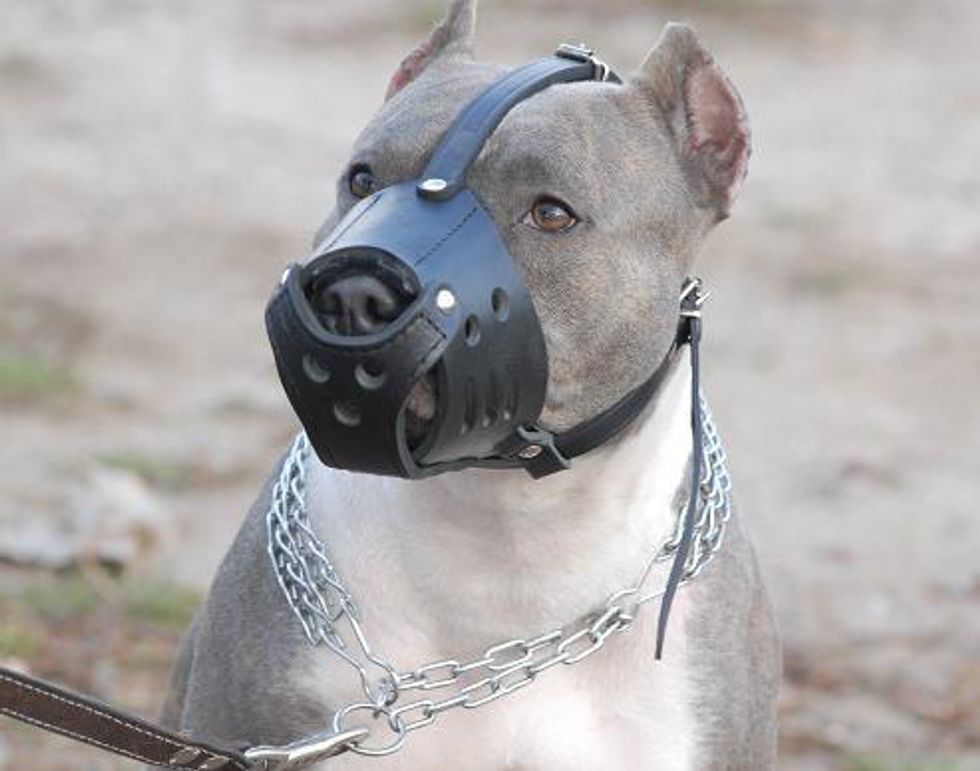According to a new Montreal bylaw, all shelter dogs considered pit bulls will be euthanized.
Montreal's law bans pit bulls city-wide. Residents can no longer adopt the breed, and on October 3, all unclaimed pit bulls--those within city shelters--will be put down. Claimed pits (those with homes) are exempt--unless owners fail to pay $150 for a "special permit," in which case their dogs can still be confiscated and euthanized.
The law was passed in response to a mauling three months ago. In June, 55-year-old Christiane Vadnais was killed by a loose neighborhood dog. Officers who arrived at the scene shot the animal, which they described as a pit bull.
It's a complicated situation, full of high emotion and good intentions. But there's a big question lurking.
Are some breeds just bad?
Protective dogs like pit bulls, Rottweilers, and Dobermans have a vastly different image than, say, cuddly golden retrievers. These breeds are often branded as aggressive "attack dogs." But is it really so simple? Is every pit bull dangerous?
There are a couple ways to answer these questions.
Nature versus Nurture.
"Nature versus Nurture" is a catchy way to pose a complicated question. Is behavior determined by genetics (Nature) or experience (Nurture)? Here's a tip: absolutely no animal, human or otherwise, is all one or the other. Each creature is a complex blend of genetically-determined behavior and behavior learned from experiences. My dog was born with a gut-deep instinct to hunt, but he's learned it's a lot easier to get food by bouncing around my feet at exactly 5 PM every day.
So, back to our question. Are some breeds born bad?
The answer is no, because every single dog -- every single pit bull -- is a different combination of Nature and Nurture. To label an entire breed dangerous is a huge oversimplification: some individuals were pushed to violence. Some will never bite anything more than their favorite toy.
Owners and Environment.

Some breeds do log more bites than others. But, before you crucify those breeds, keep the big picture in mind.
Protective dogs (Rottweilers, pit bulls, etc.) are often sought out by irresponsible/abusive owners. Drawn to the dogs' macho image, these negligent owners are more likely to encourage aggression in their animals; also, animals in a stressful, aggressive environment are more likely to lash out. While bite data may look skewed against pit bulls, keep in mind a lot more pit bulls are in tough situations than, say, basset hounds.
In short, euthanizing animals based on stigma is an easy but ill-informed solution. Putting effort into breaking the cycle of abuse will be far more productive and humane.
Animal advocates haven't taken this ban lying down. Many are trying to get shelter pits out of the city and into temporary foster homes. “These dogs have done nothing to be in this situation,” says Chris Hughes, the operator of a U.S. senior dog rescue. He is now stepping up to give at-risk Montreal pits a home.
The CDC, American Bar Association, and American Veterinary Society of Animal Behavior have all condemned breed-specific banning as ineffective. But Montreal's ban remains in place and, as I'm writing, its shelter pits have four more days to live.
***
To Help:
According to Huffington Post, "There are...rescue groups on the ground that are transporting pit bulls out of Quebec that need support. These groups include Nova Scotia-based PAWS, Abilities Rescue Society and One Last Chance Animal Rescue in Montreal. To check out their GoFundMe pages, click here and here, respectively.
If you think you can help transport or home dogs outside of Quebec, you can also contact the Montreal SPCA at tbenoit@spcamontreal.com."














































